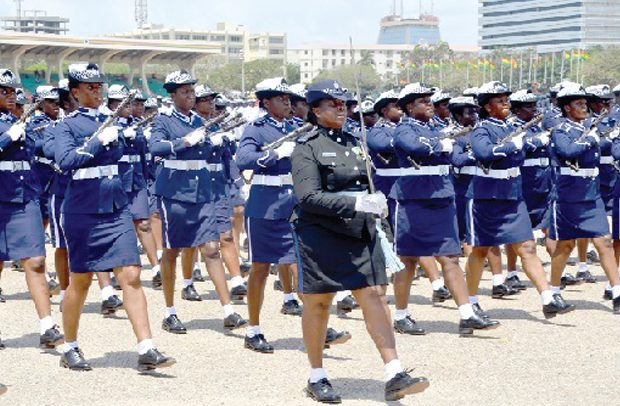Seventy years ago, 30 young women responded to the call for enlistment into the Gold Coast Police Force. At the time, they did the significance of the 12 who eventually passed through the testing processes and reported to the Police Depot to commence their recruit training in 1952, perhaps did not dawn upon them.
They constituted the nucleus of the now thriving female policing in the law enforcement system in the country.
Today, seventy years since that momentous date when they appeared before British colonial police officers to go through the drill of enlistment, the number of female police officers has grown exponentially although relatively small when juxtaposed against their male counterparts.
The then Commissioner of Police/Mr. M.K.N. Collens, then head of the Gold Coast Police, who played a crucial role in the subject, deserves a pat on the back.
While touting the gains made by female policewomen in law enforcement in the country, the Chief of Staff, Madam Akosua Frema Osei-Opare, pointed at a government policy at addressing gender inequalities in public institutions which for us, could not have been made a better forum.
The positive impact of female policing on the maintenance of law and order in the country, as contained in extensive research to which the Chief of Staff alluded to in her remarks, is instructive and should provide impetus for government to do more in enhancing the work of women in the law enforcement system.
We cannot remember women incurring negative headlines as their male counterparts have sometimes done although they constitute only 12,454 of the 43,546 of the total number of police officers in the country.
Celebrating females in police uniform and plainclothes presents us with an opportunity to ask for more as Oliver Twist did in terms of entrusting them with more responsibilities devoid of the stereotyping which affected their rise in decades past.
Between 28th January, 2009 and 15th May, 2009, Mrs. Elizabeth Mills-Robertson became Ag. IGP, a clear message that women can do it when offered the opportunity.
Gender parity should constitute a cornerstone of the Police Administration’s policy as we celebrate their 70th anniversary. Of course, the current figure of 282 women holding senior officer positions in relation to 1,456 males might not deserve a clap, as it does signify the commencement of a journey with full hope that the final destination of gender parity would be reached someday.
Identifiable programmes should be rolled out to boost the morale of women in law enforcement.
Domestic violence continues to plaque many a home in our country and would of course require intervention. When women in the Police are given specialist training in psychology and exposure to matters related to domestic violence, they would be in a better stead to manage the social anomaly in our circumstances.
Supol Gladys Parker-French (rtd) (PW 6), C/Inspr Adelaide Tagoe (rtd) (PW 4), and ACP Margaret Darkwa (rtd) (PW 3), and your colleagues who have returned to their maker and those still serving, we doff our hats for your unblemished service to Mother Ghana. Bravo!


